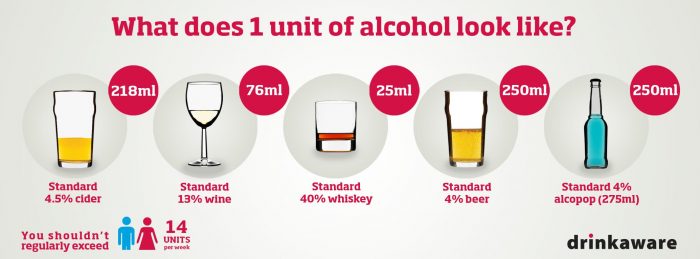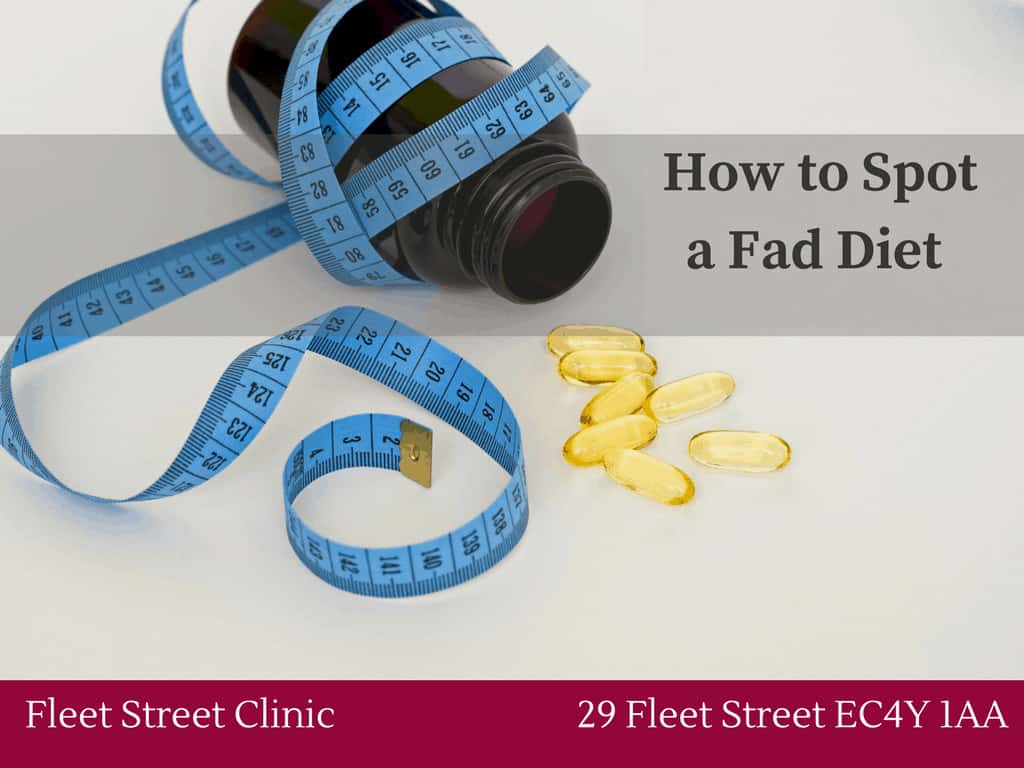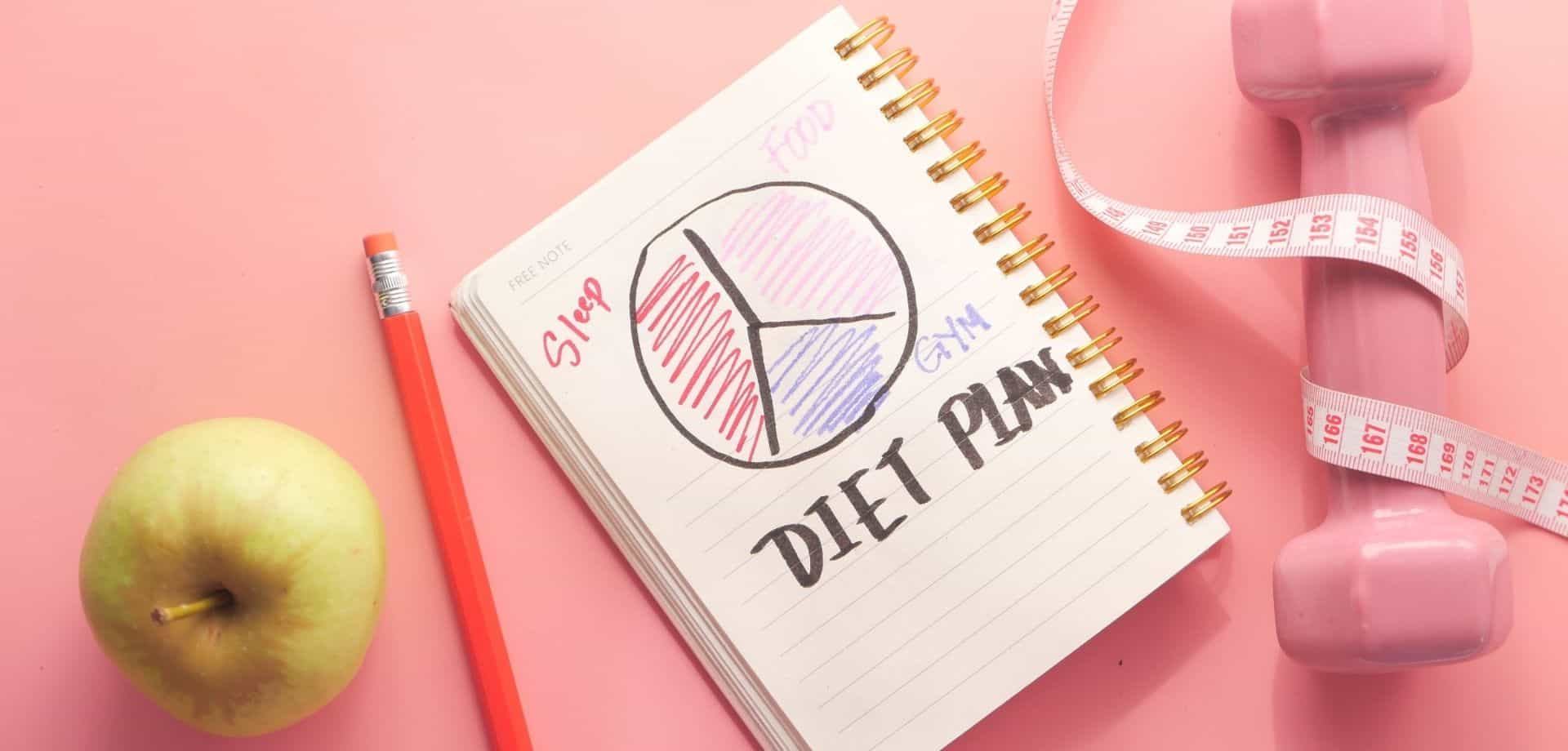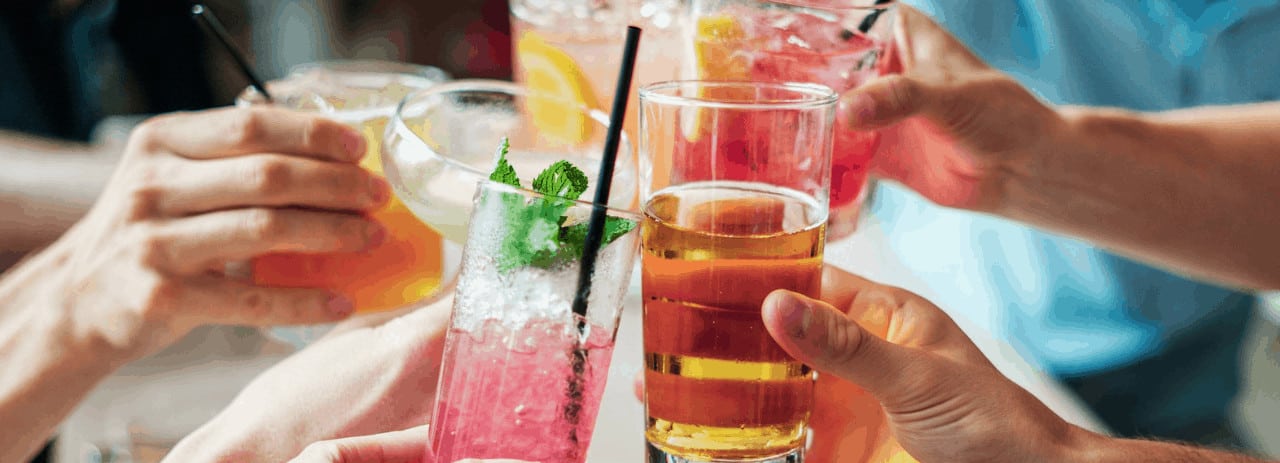Category: Dietitian
Dry January grows in popularity year on year.
The campaign by Alcohol Change UK, encourages participants to give up alcohol for the entire month of January.
The dry January one-month booze-free challenge can have a significantly positive impact on your health.
Alcohol has proven to increase the risk of developing a range of health problems (including cancers of the mouth, throat and breast) and that risk increases the more you drink on a regular basis.
Ruth Kander, our dietitian, looks at what is considered a safe amount of alcohol consumption.
The UK Chief Medical Officers’ (CMOs) guideline for keeping health risks from alcohol to a low level for both men and women states that:
- It is safest not to drink more than 14 units a week on a regular basis.
- Regularly drinking as much as 14 units per week, it’s best to spread your drinking evenly over three or more days.
– If you have one or two heavy drinking episodes a week, you increase your risk of death from long-term illness and injuries. - Cutting down the amount you drink, a smart way to help achieve this is to have several drink-free days a week.
A useful website for more information about alcohol is www.drinkaware.co.uk
What is a unit of alcohol?

How long does alcohol stay in your body?
On average, it takes about one hour for your body to break down one unit of alcohol, however, this can vary, depending on:
- Your weight
- Whether you’re male or female
- Your age
- Your metabolism – how quickly or slowly your body turns food into energy
- How much food you have eaten
- The type and strength of the alcohol you have consumed
- Whether you’re taking medication and, if so, what type
- It can also take longer if your liver isn’t functioning normally
If I am on medicines can I drink alcohol?
People taking sedative drugs (like diazepam/valium) or antidepressants (like fluoxetine/Prozac) should avoid alcohol altogether.
There are some antibiotics; metronidazole and tinidazole which just do not mix with alcohol – drinking with these will make you sick. But for most commonly prescribed antibiotics, drinking is unlikely to cause problems so long as it is within the low-risk alcohol unit guidelines.
People taking long-term medications should be careful about drinking, as alcohol can make some drugs less effective and long-term conditions could get worse. Examples of long-term medications include drugs for epilepsy, diabetes, or drugs like warfarin to thin the blood.
(From www.drinkaware.co.uk)
What are the consequences of drinking too much alcohol?
- Low mood/mood swings
- Liver problems
- Heart problems
- Cancers (mouth, tongue, throat, oesophagus)
- Weight gain
- Poor sleep
- Blood pressure instability
By Ruth Kander BSc(Hons)RD | Dietitian
If you wish to discuss ways to maintain a healthy diet and reduce your alcohol consumption, Ruth holds a virtual clinic every Friday from 9am-2pm. Please call our reception team on 020 7353 5678 if you would like to request a face-to-face appointment
Chronic kidney disease (CKD) is a long-term condition where the kidneys don’t work as well as they should. In some circumstances, the loss of kidney function can get progressively worse over time but CKD only reaches an advanced stage in a small proportion of people. Although the damage is irreparable, sometimes if changes are made, CKD can be halted with no further damage occurring.
Chronic Kidney disease (CKD) is divided into 5 stages.
Stage 1 is the earliest stage whereby tests have indicated some level of kidney damage. It is important not to ignore a stage 1 diagnosis as this is the time to take action and make lifestyle changes so that the condition does not worsen. With every increase in stage, more kidney damage has been detected up until the last stage, stage 5. Stage 5 means the kidneys have lost almost all their function and it will be time for thinking about dialysis or a transplant.
What to do if your recent blood test shows a reduced kidney function.
Don’t panic, absorb the diagnosis and understand this doesn’t definitively mean your kidneys will stop working altogether. CKD should not be ignored as it can get worse over time but with careful monitoring and management it can be maintained and you can live long fulfilling lives without being unduly affected by the condition.
It is important to review your lifestyle and in particular, your diet. With early stage CKD (stages 1-3) it is paramount to be as healthy as possible and have a healthy balanced diet.
What do I mean by a healthy balanced diet?
This includes:
- Consistently eating freshly cooked food for every meal
- Limiting your intake of processed foods and avoid highly-processed foods
- Reducing your daily salt intake
- Having considered balanced meals – your lunch and dinner meals should contain proteins, carbohydrates and vegetables. Your portion size will depend on your weight and if you have diabetes
- Ensuring you have a minimum of 2-3 portions of fruits and vegetables each and every day
- Increasing your intake of plant based proteins such as beans, lentils, tofu, soya, seitan
- Drinking lots of water to remain well hydrated (ensure your urine runs clear)
- Being as active as physically possible for you
- Avoiding non-steroidal medicines such as ibuprofen, naproxen etc.
What is a renal diet?
You may have heard of the term, renal diet. The term is used quite widely amongst those who have CKD, but personally, I am not a fan of this term. It doesn’t really mean much and can often be misused. People often think it means a diet of low protein, low salt, low potassium and low phosphate – which is pretty hard to do all at once and not always necessary.
People newly diagnosed with CKD in particular often restrict their diet in a panic unnecessarily and in combination with online resources not being clear enough, this can cause a lot of confusion.
My advice would be to seek guidance from someone like myself, a dietician who can look at your lifestyle and individual health and work out a personalised diet plan. This will be much more achievable and as well as not feeling so overwhelming, you’ll only have to limit the foods you absolutely need to.
How do you monitor CKD?
The best way to monitor CKD is to have regular tests, either blood or urine. How often you require testing will be dictated by the stage of CKD. Your GP will determine what is best for you and it is best to ask them any medical and testing questions rather than your dietician who will focus solely on your lifestyle and diet.
______________
Ruth Kander is a kidney-specialist dietitian, to book an appointment with her please click here.
Weight loss has become a thriving industry and we’re bombarded constantly with unhealthy FAD diets, weight loss programmes, influencers selling teas and pills all promising to help us lose weight. Many of these are promoting quick fixes which are not advised by doctors or dieticians. It can be really hard to know what information to trust. To help navigate the sea of information (and misinformation!) surrounding weight loss, we have asked one of our GPs, Dr Belinda Griffiths, and our dietitian, Ruth Kander, their advice on how to lose weight safely and successfully.
Firstly, it is important to note that weight loss should be consistent and gradual as it can be dangerous to lose too much weight too quickly. Dr Griffiths suggests that “a safe weight loss is 1-2 lbs or 0.5-1kg per week… Greater weight loss than this per week can lead to malnutrition, exhaustion, increased risk of gout and gallstones.” There is also an increased risk of developing an unhealthy relationship with food which, in extreme circumstances, could lead to eating disorders.
Ruth added, “Losing weight gradually and at a healthy rate is key.” Remember, it’s all about consistency! Perseverance will amount to healthy lifestyle changes which will allow you to achieve your weight loss goal.
Don’t underestimate diet
Both Dr Griffiths and Ruth agree that diet is the most important factor when it comes to weight loss. As Ruth explains; “having a healthy balanced diet that is lower in calories than our body uses is a good way to start the weight loss journey. If we don’t reduce calorie intake, one won’t lose weight:.” – this is known as being in a calorie deficit. The amount of calories that will result in weight loss will vary from person to person and depend on the amount of exercise the individual does. In order to lose weight, you will need to burn more calories than are consumed and therefore restricting your calorie intake is the simplest way of losing weight.
Foods to focus on
Ruth recommends that “people should focus on a variety of foods when trying to lose weight”. While Dr Griffiths suggests, “focusing on a range of lean proteins (including meat and fish), vegetables, high fibre foods (such as quinoa, bran flakes etc) and fruit in moderation”. Vegetarians can substitute in lentils, nuts, beans and tofu instead of meat and fish. In general, high calorie foods such as fried food, cakes, biscuits, chocolate and sugary drinks should be avoided.
Let’s get physical!
Although weight loss is still achievable without much exercise, incorporating exercise into your lifestyle will not only aid weight loss, but will generally improve your overall health. Any exercise is better than none whether it be tennis, swimming, or even walking, “whatever you are capable of, just do it!” is Dr Griffiths advice. Ideally, a combination of exercise is best for weight loss – this includes cardio / fat burning and resistance or weight training. Get those steps in! An easy way to incorporate more exercise into your daily routine is by aiming to walk at least 10,000 steps per day. This easy change can make a big difference and remember, as Dr Griffiths says “the more exercise you do, the greater calories are burned” – it’s as simple as that!
Don’t forget about NEAT movements!
NEAT (or Non-exercise activity thermogenesis) movement refers to the physical movement we do day-to-day that isn’t necessarily planned exercise and “encompasses the energy that we expend by simply living”.This includes the calories we burn breathing, eating, sleeping etc. Dr Griffiths suggests that “you can increase NEAT movement easily in your everyday life by making simple changes such as taking the stairs rather than the lift, by standing rather than sitting, by walking instead of taking the train/ bus/ tube or even by carrying bags rather than having items delivered”. It all adds up! These simple swaps will increase the number of calories you burn and help facilitate weight loss.
What to do when you plateau
The first stint of weight loss can make it seem a little too easy as you tend to lose weight more easily in the beginning, but a common issue lots of people face is when weight loss reaches a plateau. This is where you stop losing weight to the same extent you were before, or stop losing weight for a period of time. This can feel disheartening and more often than not, people tend to give up at this stage. Dr Griffiths states at this point “it is a case of persevering with calorie restriction and regular exercise and gradually weight loss will resume.” If it doesn’t, Ruth suggests “ looking at what you’re eating to see if anything has slipped”. She states “maybe you’re not taking into consideration extra calories here and there” but they all add up. See if there are any areas of your diet where you could be a little stricter, or consider starting or upping your exercise.
Sleep and Stress
A good night’s sleep and keeping your stress levels down will be your friend when it comes to weight loss. “In order to lose weight, you need to be in the correct frame of mind and life circumstances” says Ruth. Research has shown that you tend to eat more and make poorer food choices, including seeking comfort food, when you are sleep deprived. This is because not getting enough sleep “disrupts the hormones in your brain (Leptin and Ghrelin) that control appetite” says Dr Griffiths.
Stress can also play a part in weight loss as Dr Griffiths explains that “stress increases cortisol levels which increases gastric acid output and makes you feel anxious and hungry”. Ruth adds “there is also a theory that being stressed can limit weight loss in terms of hormonal activity in the hypothalamic-pituitary axis which can lead to the release of hormones that can limit weight loss”. Keeping it simple, “to lose weight, good sleep and minimal stress would be ideal”.
Final thoughts
Trying to lose weight can seem complicated, confusing and difficult, but when you really break it down, the ingredients to losing weight successfully are actually very straightforward. If you stick to these simple rules and you are patient and consistent, the weight will come off and you will achieve your goals.
If you feel that you are doing everything right and you still aren’t losing weight, or are even putting weight on, there could be something else causing this. You may have an undiagnosed underlying medical condition and we’d advise you to visit your GP to make sure everything is well.
If you would like any extra support with your weight loss, why not book an appointment with Ruth. Or if you have any concerns over your health, please book an appointment with one of our GPs.
How to Stay Healthy This Winter
When the temperature drops outside, it’s tempting to reach for comforting, high-calorie food and avoid exercise. Feeling cold, along with short days and weight gain can lead to the onset of Seasonal Affective Disorder or depression in the winter months.
Fleet Street Clinic’s Consultant Dietitian, Ruth Kander BSc (Hons) gives some practical advice on what you can do to avoid the winter blues.
Consume a Variety of Foods
By eating foods from all the food groups, you will have all the nutrients you need to stay healthy and keep winter germs at bay whilst maintaining your energy levels.
Eat Plenty of Fruits and Vegetables
These will give you vitamins and minerals to help your body fight winter bugs. Vitamin C is especially beneficial in the fight against colds and sore throats. Avoid taking supplements which contain high concentrations of vitamins which can lead to medical problems. Fruit and vegetables high in vitamin C include kiwi, citrus fruits, spinach, pumpkin and sweet potato. Zinc is also a good mineral to help fight winter infections and boost the immune system. Foods containing zinc include fish, oysters, poultry, eggs, milk, unprocessed grains and cereals. If you’re short on time, using a blender to create a vegetable and fruit drink is a great way to pack your diet full of vitamins. Try combining lettuce, cucumber, spinach, ginger, berries and a dash of orange juice and water for a zingy, low-sugar start to the day.
Keep the Pantry Cupboard Well Stocked
Good foods to store include:
- Tinned beans and lentils
- Tinned tomatoes
- Whole-wheat pasta
- Brown rice
- Couscous and noodles
- Wholegrain cereals – for example, Porridge and Weetabix
Plan Your Meals
Make soups and casseroles in advance and freeze. That way you can come home to a nutritious meal in the evenings. Simply take out of the freezer in the morning so that they are ready to heat up after work.
Watch Portion Sizes
To avoid eating too many carbohydrates, try eating your meals at the table with the TV turned off, use smaller plates and reserve half your dinner plate for vegetables. If you want more after your first serving, have some soup or more hot vegetables.
Stay Active
It’s tempting to reduce your exercise regime in the colder months. But small efforts can go a long way to help stave off winter weight gain. Going for a regular, brisk walk or using an exercise video at home can be enough to maintain your weight and stay healthy over the winter.
Drink Plenty of Fluids
Try to avoid getting dehydrated. This can make you feel overly tired and unnecessarily run down. Drink plenty of fluids throughout the day that are either low calorie or calorie-free – aim for 2 litres a day. Be aware that your daily hot drink from the coffee shop can contain 360 calories or more!
Looking for an alternative to still water? Try green tea, regular tea, herbal teas, regular coffee, hot no added sugar cordial or lemon water.
Consult Fleet Street Clinic
Ruth Kander holds a virtual clinic every Friday from 9am-2pm for individual dietitian consultations and ongoing weight management courses. Please call our reception team on +44 20 7353 5678 if you would like to request a face-to-face appointment
So you’re back to work and the tree’s on its way back to the loft. Time to come through on all the New Year’s resolution bravado. Here are a few tips about how to do just that.
Create a plan
Decide what it is you’re wanting to achieve and tailor your program towards it. Do you want to lose weight? Get fitter? Tone up? All three? Don’t just choose the new fitness regime trend, think what you enjoy to do and go with that! You stand much more chance of continuing if you do. Identify times of day when you can exercise and which days you will do it. It’s much harder to stick to a regime that is just squeezed in when and if you have the time (not to mention inclination!)
Determine your readiness
Make sure you are mentally and physically ready to start, and more importantly ready to stick to, a regime. Check with your GP if you have any concerns about your health before you start. A good proportion of my new patients come from people who have caused injuries in the first few weeks, or even days sometimes, of starting a new regime. If you have any niggles, get them treated, and get advice on how to prevent them from recurring.
Be realistic
Set goals that are achievable and realistic. To lose a stone or be able to run 10k by Easter are realistic. To decide you are going to the gym every day before breakfast probably won’t last long. Fitness needs to be built gradually with a good base. Get advice on what exercise you need to do. Just running will help cardiovascular fitness somewhat, but needs to be part of a balanced all-around program if you want to be healthier generally. To maintain it, alone, running will also soon start to cause musculoskeletal problems.
Talk a friend into joining you
There will probably be no shortage of people thinking along the same lines as you. Teaming up hugely increases the chances of you both sticking to a program and makes it much more fun and less painful than trying alone. Even just planning together and talking about what you’re doing, (even if diaries don’t allow actually exercising together), is really encouraging.
Think long-term
Don’t look at this as a quick fix just to drop a few pounds. Take it easy and don’t rush. Tailor your plan around becoming more fit and healthy permanently. If you do it will help with so many other things, from energy levels to less aching joints or back, to stress relief and better sleep.
By Andrew Doody | Osteopath
Andrew is available for pre-exercise assessment, advice on exercise/regime planning, and diagnosis/treatment of outstanding or new issues, as well as advice on injury prevention. You can book an osteopathy appointment online.
January is a great time to take control of your eating and help yourself to be a healthy you with the food you eat. Eating a more plant-based diet is undoubtedly recommended by many of the health professionals, however, it is essential that a healthy approach and balance is taken. Switching to a vegan diet can be unhealthy as well as healthy. In a vegan diet, it is essential to take note of particular nutrients that can get missed out which can lead to serious health consequences.
Protein
It is easy to not eat enough protein in a plant-based diet. Your body needs essential amino acids to build proteins and be healthy, so you should ensure you have a wide variety of proteins in your diet, such as:
- Soya
- Beans
- Lentils
- Seitan
- Quinoa
- Tofu
- Tempeh
- Nutritional yeast
Calcium
Calcium is an essential mineral for bone health. Insufficient calcium can lead to weak bones and bone fractures. Try and include as many calcium-containing foods each day. When choosing plant dairy alternatives try and choose those which are fortified with calcium. For milk look for at least 127mg calcium per 100g plant milk.
Foods that contain calcium include:
- Green leafy vegetables
- Tofu
- Bread
- Fortified plant milk
- Cauliflower
- Nuts
- Oranges
- Fortified plant based dairy alternatives
Iron
Iron is another essential mineral required for good health. Iron is a component of red blood cells. If we don’t eat enough iron then we can develop anaemia. This can cause severe tiredness, lethargy and generally feeling unwell.
Plant-based sources of iron include:
- Lentils
- Beans
- Tofu
- Tempeh
- Nuts
- Green leafy vegetables
- Fortified breakfast cereals
When eating these food, have with a food or drink high in vitamin C such as kiwi fruits or strawberries as these will enhance the absorption of iron. Avoid tea and coffee as this limits absorption of iron.
If you think you don’t get enough iron a simple blood test can confirm this, do check with your GP.
Vitamin B12
Vitamin B12 is the only vitamin present in animal food products.
There are some vegan products fortified with B12 such as;
- Nutritional yeast
- Yeast extract e.g., Marmite
- Breakfast cereals
If you have been vegan for some time, it may be worth considering a blood test to check your B12 levels. Discuss this with your GP.
Iodine
Iodine can be low on a vegan diet and can affect thyroid function. Sources of plant iodine include:
- Seaweed
- Iodized salt
Omega-3
Omega-3 containing foods, especially those high in alpha-linolenic acid (ALA) are involved with helping the body produce longer-chain omega-3s such as eicosapentaenoic acid (EPA) and docosahexaenoic acid (DHA).
Foods high in ALA include:
- Chia
- Hemp
- Flaxseeds
- Walnuts
- Soybeans
However, there is controversy as to whether this conversion is good enough to meet everyday needs. Some suggest a daily intake of 200–300 mg of EPA and DHA from an algae oil supplement may be a better way to prevent low levels, however, always check with your GP before starting any supplements.
Zinc
Zinc is required for overall good health but in particular for healthy hair and nails. Plant sources of zinc include:
- Beans
- Chickpeas
- Lentils
- Tofu
- Walnuts
- Cashew nuts
- Chia seeds
- Ground linseed
- Hemp seeds
- Pumpkin seeds
- Wholemeal bread
- Quinoa
By Ruth Kander BSc(Hons)RD | Dietitian
If you wish to discuss ways to maintain a healthy vegan diet or are thinking of becoming a vegan, Ruth holds a virtual clinic every Friday from 9am-2pm. Please call our reception team on 020 7353 5678 if you would like to request a face-to-face appointment
So Veganuary and Dry January are over… what happens next?
With your January healthy challenges over, you may be feeling healthier and refreshed knowing you have managed to stay vegan and/ or teetotal for 1 month. For some of you these new eating and drinking habits are here to stay but for many of you, it is now time to reintroduce meat and alcohol back into your diet safely.
A key theme to remember is everything in moderation!
What you eat and drink forms the backbone of maintaining a healthy lifestyle, which should always be the goal of any dietary alterations. Everyone’s dietary needs are different depending on their age, size and activity so there are no concrete rules to follow.
Read my top tips on how to reintroduce food and drink safely back into your diet.
Veganuary Tips:
Plant proteins are low in fat and high in fibre which is great for your gut health and cholesterol so following Veganuary these should continue to play a key part in your diet.
It is important to reintroduce food gradually and to start light. For the first few weeks stick with a predominantly plant protein diet and begin by introducing eggs and dairy initially. Move on to poultry and fish as these are easier for the body to digest than red meat but are high in healthy proteins. You will get the benefit of high-quality proteins and you won’t be missing out on iron.
Red meat is not bad for your body in moderation but it is calorie dense and the body digests it slower than any other food group. Your body won’t be used to the high protein content of red meats at the moment so introduce them in small quantities at first, building up so not to aggravate your digestive system.
Dry January Tips:
With regards to alcohol, it’s always nice to have a glass of wine with a meal or to relax at the weekend. But moderation is key. Try to keep within the limits of 14 units a week for both males and females and have frequent alcohol-free days throughout the week. It is important to remember not to have 6 alcohol-free days and save all 14 units to be consumed in 1 day, spread the 14 unit out evenly across the week.
An example of responsibly consuming alcohol could look like:
Weekly Alcohol Plan |
|
| Monday | Alcohol-free |
| Tuesday | 1 medium glass wine or equivalent |
| Wednesday | 1 medium glass wine or equivalent |
| Thursday | Alcohol-free |
| Friday | 3 medium glass wine or equivalent |
| Saturday | 2 medium glass wine or equivalent |
| Sunday | Alcohol-free |
*175ml (Medium Glass) = 2 Units / 250ml (Large Glass) = 3 Units

Drinking alcohol on an empty stomach will make you hungrier and increases the likelihood of snacking and unhealthy eating. It is much more preferable to drink alcohol with a meal as eating will distract you and make you fuller meaning you’ll consume less alcohol.
By Ruth Kander BSc(Hons)RD | Dietitian
If you wish to discuss ways to maintain a healthy vegan diet or would like more advice on how to reintroduce food back into your diet, Ruth can help. You can book a dietetics appointment online.
Our InBody scanner lets you take control of your health
Do you want to take steps to manage your weight? Are you looking to lose weight or gain muscle? If so, the first step to changing your body is to get accurate measurements of your current stats.
Here at the Fleet Street Clinic, our Inbody scanner provides you with a detailed analysis of your body’s composition. This gives you an accurate way to measure your weight g oals.
You can use the InBody scanner by booking an appointment. Our nurse will measure your height, document your age and the scanner does the rest! Accurately measuring your weight, body fat, muscle mass, BMI and basal metabolic rate, the InBody scanner tells you if you are above, below or in the normal range for your age and height. You’ll receive your results as a one-page analysis, which we will talk through with you. From this, you can set your achievable long-term health goals.
Look for more help with your health goals?
If you’re looking to get some more direction on how to achieve your health goals, our dietitian provides weight management advice to improve your health to optimal levels.
January is here and with it comes a fresh New Year, a good time to shed any extra weight gained over the party season. Sadly, despite all the ‘quick fix’ diets, and a variety of diet pills on offer that promise you will ‘drop ten sizes in ten days’, there is no miracle cure.
WHAT IS A FAD DIET?
A fad diet is normally endorsed by a celebrity of some sort and or a non-healthcare professional and will usually cut out one or more food groups. What will usually happen is that you try the fad diet and lose weight very quickly. So what’s the catch? You’ll inevitably get bored as the diet will be unsustainable, and then return to your normal eating habits and put all the weight back on and more.
HOW TO SPOT A FAD DIET
Does your new diet:
- Cut out major food groups such as wheat, dairy or yeast?
- Promise you’ll lose more than 2lbs a week?
- Seem very restrictive and hard to follow?
- Require that you buy special expensive foods to follow it?
- Tell you the reason you ‘can’t lose weight’ is probably a food allergy?
- Provide no clinical evidence?
- Promises to be the answer to all your problems?
Yes to any of the above? It’s a fad.
Be aware of who is offering advice:
There are many people out in the world today promoting all sorts of diets to help you feel great and lose weight, however many of them are not medically trained.
Be aware of practitioners who use tests such as:
- Blood tests, especially those that mix your blood with food.
- Hair mineral analysis to tell you what you should eat.
- Stool analysis.
- Looking in your eyes to tell you what diet to follow.
- Kinesiology.
- Face reading.
None of these have any clinical evidence that they can help with weight or any other nutritional issues.
BUT I STILL WANT TO LOSE THOSE EXTRA POUNDS… think of the phrase ‘eat half, walk double’!
Let’s go back to basics:
- Have three, balanced meals spread out throughout the day.
- Eat the three meals in a 12 hour time frame.
- Have 5 portions of fresh fruits (2-3 portions) and vegetables (2-3 portions) daily.
- Include two portions of protein daily – tofu, beans, lentils, soy, chicken, eggs, fish.
- Balance out your meals. Lunch and supper should be half a plate of vegetables, a quarter protein and a quarter carbohydrates.
- Get in 30 minutes of exercise daily. Cycle to work, go for a walk on your lunch break – get moving!
- Avoid snacks that are high in processed sugar or fats like nuts, crisps, biscuits cakes, chocolates. Replace your cravings with fruit and vegetables but keep fruit to a maximum of three times a day. Even fruit has high levels of sugar.
- Keep hydrated – most people require two litres of water per day.
Want Help With Your Eating Plan?
If you’d like more support from a professional, you can book an appointment with Dietitian Ruth Kander for some much needed January motivation.
What is Coeliac disease anyway?
Coeliac disease is an auto-immune condition, defined as
a disease in which the small intestine is hypersensitive to gluten, leading to difficulty in digesting food.
We’ve all heard the term “gluten free” of late, something that has become synonymous with the fad diet of the moment, but for suffers of this fairly common disease, what does being a coeliac actually mean?
Gluten is a type of protein found in many types of food. Let’s be clear, being a coeliac does not mean that you have a gluten intolerance. When you are a coeliac, your immune system responds to the gluten in your food like it is a threat and attacks it. This in-turn damages the lining of the small intestine and hinders your body’s ability to digest nutrients from food properly.
What food can gluten be found in?
Any food containing:
- Wheat
- Barley
- Rye
The most common food with gluten in:
- Pasta
- Cake
- Breakfast cereal/bars
- Bread
- Bottled sauces
- Beer
What are the symptoms of coeliac disease?
There are many varied symptoms of being a coeliac but some of the most common symptoms are:
- Diarrhoea
- Bloating and passing wind more regularly
- Pains in your abdomen
- Feeling tired all the time
How do you treat coeliac disease?
Although there is no cure for being a coeliac, you will need to follow a gluten free diet to appease the symptoms. With a little time and effort, most sufferers can follow the diet and carry on about their regular life with no further complications from the illness.
This can be tricky at first as there are so many products you would pick up from your local supermarket that contain gluten. It’s best to speak with an expert for advice on how to manage your diet. At Fleet Street Clinic we can screen for many food intolerances as well as assisting you in every step of the way should your tests coming back positive for an allergy.
If you have any concerns regarding coeliac disease or any other type of food intolerance, please book an appointment online. Or you can contact on 020 7353 5678 for more information.









